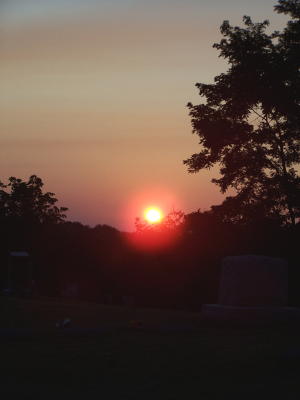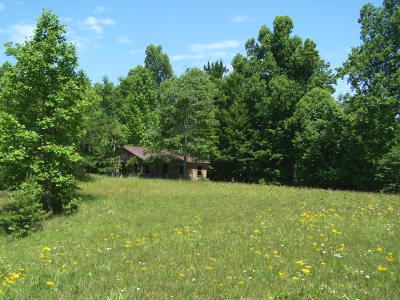SUNNY CAL JOURNAL - Fast Fading People Of Place, Life In The Backwoods

In the 21st century, John Denver's song
"Country roads, take me home, to the place
I belong ..." has diminished in meaning
(Photo at Hur WV)
By Bob Weaver
In Calhoun we have both been held back and blessed by our steep hills, which most outsiders consider mountains.
Growing up here, I had little awareness how steep they really are, but now I often stop and look at the hillsides and their beautiful landscape, mostly fit for goats and exhausting for those who climb them.
There's hundreds of hills (mountains) that are so steep you cannot stand on them, and many spots that no human has set foot.
By most standards, Calhoun is heavily forested, craggy, hilly, and isolated with little flat land.
Harry Simmons, a former resident who has flown low over the county in his flying machine, exclaimed "You can't believe how forested it is and how little of it is inhabited."
The county is among the most forested in the Mountain State, nearly 90%.
The topography is generally blamed for our lack of progress, with the high cost of bringing infrastructure to the area. In the tincture of time it could be a blessing.
It cost a fortune to build a "modern road" in West Virginia. Here in Sunny Cal, we have paved roads over cow paths and early trails.
We've been trying to get a "modern road" through the county with the Little Kanawha Parkway since the 1970s and the Blue-Gray US 33 project since the early 1960s.
Both projects have been abandoned, despite some stellar efforts.
A long-time effort to bring real broadband to the rural county continues to languish, after years of loud promises. The county and state, by most studies, still is near the bottom of the barrel with 21st Century technology, the new infrastructure.
While the rest of the world has been moving ahead and growing, our population has continued to decline these past 80 years, the county and region have floundered with the globalization of manufacturing jobs and job reduction by mechanization.
In West Virginia, even the lowest paying jobs went abroad, while politicians railed against high-paying union jobs.
The richest of Americans and corporations have been getting wildly richer, with the 'trickle down' promise to relieve the rest of us. They know how to skip income taxes and hide their wealth.
Politicians are always going to change that.
It is an eye-opener to read the list of corporations that play no taxes, and the long list of corporations that get government tax breaks.
A few years ago we learned that multi-millions of dollars spent by the Appalachian Regional Commission (which was to have brought infrastructure to the poorest mountain places) went mostly to regions that had "greater promise," and in most cases already had developed infrastructure.
It's true our hills tend to protect us from many problems, maintaining a sense of peace and safety unknown in urban areas and strife-worn parts of the world.
It is fascinating that our isolation is what attracts outsiders to come and live here these past years.
Now, the Calhoun population has dropped and nearly to 5,800 and half of the citizens are transplants who have come here to enjoy the quiet.
The hills, despite modern transportation and communication, still create an exaggerated sense of distance, separation and distrust. A good example is the 150-year-old division of northern and southern Calhoun.
"Grantsville dudes part their hair in the middle," according to an old newspaper article and southern forkers are people who don't care about ritin' and 'rithmatic. See  County Seat Battle Flares Again In 1898
That conflict, intensified by the Civil War and the location of the county seat, was a battle over place.
During much of Calhoun's existence, life was focused on what lay before its citizens, the area closest to their homes.
Rev. Glendon McKee said "My whole world extended only as far as I could see."
Calhoun educator Eugene Reynolds said in much of the 20th century, most Calhoun children had not crossed the county line.
Calhoun's original families were people of place. After leaving, they were always "coming home" in person or spirit.
The demise of the county's agricultural economy came after World War II, when folks left in droves to seek work and fortune. During the 1950's and 60's they often returned for weekend visits, and most came back to be buried near their place.
Now, few return to visit, let alone be buried here.
In this newest century, people frequently move and change jobs - rolling stones, un-rooted, disconnected.
The culture of a people of place - a small community of people on a parcel of land even here is vanishing.
We have been merged, consolidated and globalized - "bigger is better," much of it drives the poor economy, while bigger creates a greater mechanism to make money and have more control over it.
The smallest, most rural and poorest, gets the bloody hammer.
I lived in the Village of Hur, while others lived in faraway places like Joker or Rocksdale, and Grantsville was a place that required a planned trip. If you lived two miles from someone, you referred to them as "living over there."
Every nook and cranny had a name, Sandy Low Gap, Holl Kerby Turn, Bear Rock, the Coal Mine, the Jeff Bank, Buck Ridge, Buckhorn or Kerby Ridge.
Being born into the world, you would have been born into your place, your home, indelibly connecting you to that spot, no sanitized hospital, delivery room or obstetrician.

"My place was this tiny five-room house,
in which I was born, deep in the woods, still
barely standing in 2006" - Bob Weaver
I was born on the Buck Ridge, a short distance from my current abode, in a house my dad built for $500 during the Great Depression, shortly after he married my mother in 1933.
It was never visited by a traveling salesman.
The house never had indoor plumbing, telephone or electric, but did have a plentiful spring down a steep hillside behind the house. The road from the house to the Village of Hur was pure mud.
The little farm had a chicken coop, log barn and pig pen, with a meadow, a little pasture land and a garden patch. It was a good walk out to the mail box at the "hard road."
The main road had stone napped into the mud by my dad and other WPA workers. Unable to afford an automobile during the depression, my dad walked nine miles to work at Grantsville.
While the Buck Ridge is my place, I was frequently reminded of whose place it was before my time, the families of Alexander and Kissiah Slider Riggs Buck. Alexander was a Union solider in the Civil War, he returned to Calhoun before he went blind and married Kissiah, my great-great grandmother.
He's buried over in the Hur Cemetery, near his place.
So, it's fair to say, with the rapidly changing politics, economy and culture, you will not be defined by your family of origin or where you're from - a place.
Just how you'll be defined as a person will mostly likely be your occupation, how well-traveled you are, how much money you have earned or how well you are connected with 21st Century technology, all driven by a life of conspicuous consumption.
Maybe that can be a good thing, but my mind languishes in values of times past - my place, my community and my family - roots in the clay and the beautiful landscape admired out my window.
Could it be that life in the backwoods is among the best places to be, particularly when the Great American Experiment collapses?